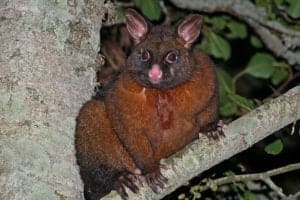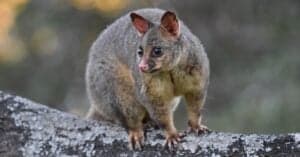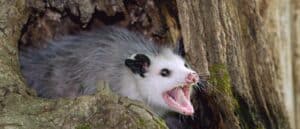If you’ve ever heard the clumsy sounds of a possum rooting around in your garbage, you might just assume it’s blind. After all, possums only come out at night, right? Do they really need to be able to see? It turns out, the answer is not that simple! Read on to find out if possums are really blind and what senses they use to get around.
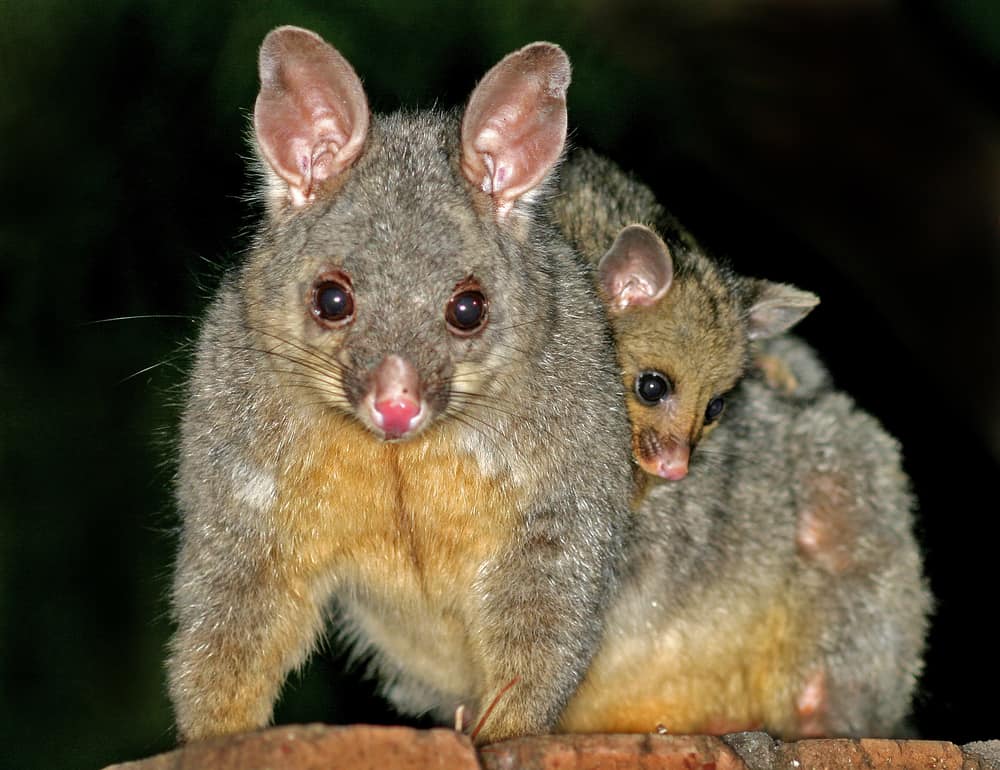
Possums and opossums are not blind, though they see much better at night.
©Stuart Elflett/Shutterstock.com
What is a Possum?
A possum is a type of marsupial found in Australia and the Americas. However, to be perfectly accurate, the term “possum” technically refers only to those species of marsupials inhabiting Australia and the surrounding islands like New Zealand, Papua New Guinea, and the Solomon Islands. “Opossum” refers to species of marsupials inhabiting North, Central, and South America.
As marsupials, possums and opossums have pouches to carry their young. These mammals range in size from only a few inches long to the size of a housecat depending on the species. The Virginia opossum, perhaps the most famous of the opossum species, is among the largest. It is also the only marsupial living in North America. Australia has a number of pygmy possum species including the diminutive Tasmanian pygmy possum.
Are Possums Blind?
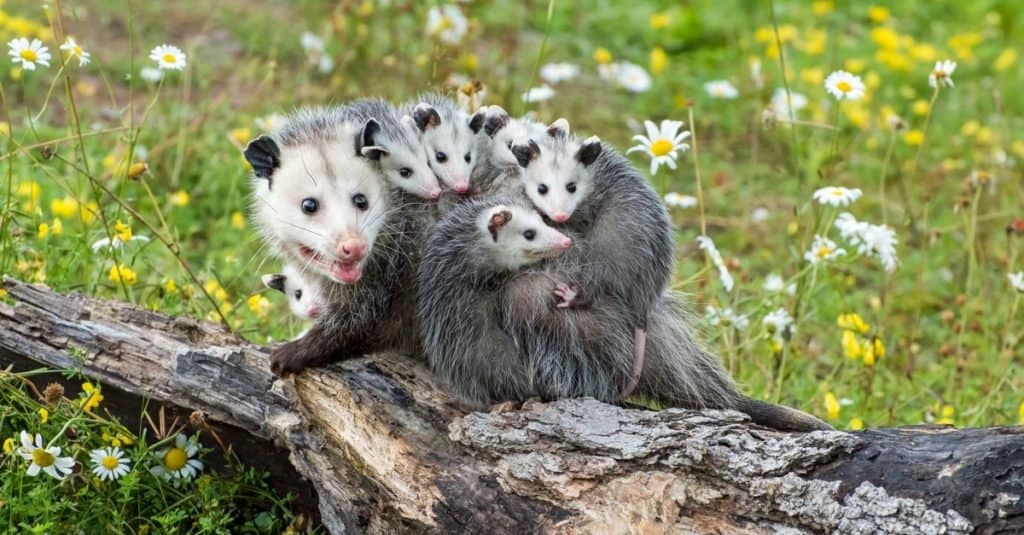
Possum babies are blind at birth. After a few weeks, they gain their sight.
©Evelyn D. Harrison/Shutterstock.com
Possums and opossums are not normally blind as adults. The idea that they can’t see comes from their generally poor eyesight, which especially hampers their vision during the day. This is due to their permanently dilated pupils. They see much better in the dark than during daylight hours, suiting their nocturnal bent. As a result, both possums and opossums are most active during dusk, through the night, and just before dawn.
Some possum and opossum species have better eyesight than others. One notable exception to the general rule is the Central American woolly opossum, a species with incredibly sharp binocular vision. This adaptation gives them stellar hand-eye coordination.
Though adult possums and opossums are not blind, their babies are born without sight and completely helpless. They rely totally on their mother’s protection to survive, crawling into her pouch immediately after birth. They remain there for a number of weeks until they are old enough to emerge and ride on her back. The pouch acts as a kind of second womb, allowing the underdeveloped joeys to complete their development.
Where Do Possums Go During the Day?
Possums and opossums hide during the day to avoid predators and to rest for a long night of foraging. Australian possums typically live in tree hollows, though these aren’t always available in urban settings. In cities and towns, possums often take refuge in houses and sheds. They squeeze through gaps in roofs and walls to access attics, the corners of garages, and the undersides of homes. In Australia, the government protects possums, meaning humans can’t remove them from their property without a special permit. This is to ensure the rehoming process is completed properly.
Unlike their Australian cousins, opossums frequently live in burrows as well as trees. They rarely dig their own holes, preferring to commandeer the abandoned burrows of other animals. Occasionally, they even take over nests.
How Do Possums Hunt?
Since their eyesight is generally poor, possums and opossums rely mostly on their sense of smell to aid them in their quest for nutrition. They are famous for being scavengers and opportunists, eating whatever they come across. This tendency is especially true for opossums, who cause headaches for homeowners by getting into trash cans in search of leftovers. Possums and opossums spend their nights actively searching for food, whether that involves grubbing for insects, hunting rodents or birds, or overturning garbage bins.
Both possums and opossums enjoy eating a variety of insects, consuming pests like ticks, cockroaches, and beetles. They occasionally hunt small animals like rodents, rabbits, snakes, lizards, or fish. They may even scale trees to search bird nests for eggs. Much to the disgust of much of the animal kingdom, possums and opossums will even eat carrion.
Other Possum Senses
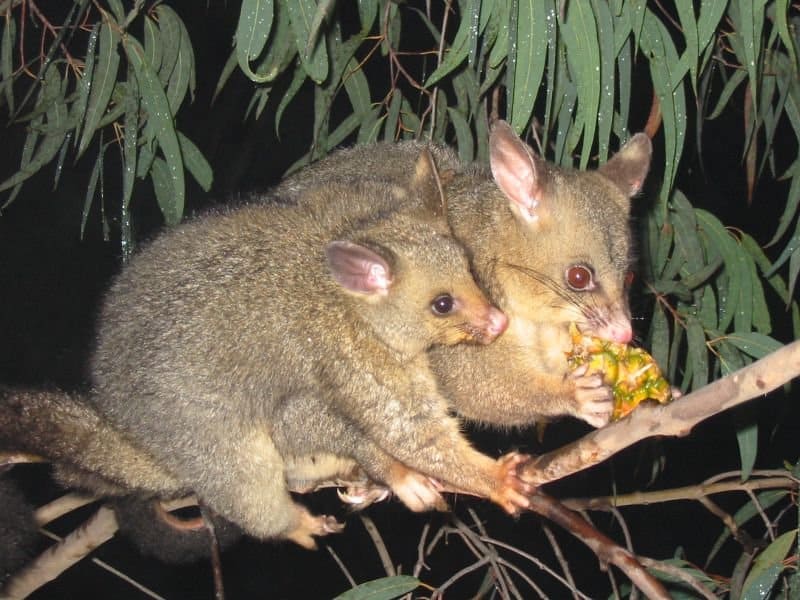
Possums don’t have great eyesight, so they use their keen sense of smell to help them find food.
©Peter Firminger / CC BY 2.0, Flickr – License
Though possums and opossums are not normally blind as adults, their vision is nothing to brag about. Consequently, most species must rely on other senses to get by. Their sense of smell is particularly keen. This should come as no surprise to homeowners who constantly battle to keep these marsupials out of their garbage. Possums and opossums easily track down small morsels of food or tiny insects in the ground using their specialized noses. They also have great hearing, which aids them in avoiding predators and catching the sounds of scurrying prey.
Interestingly, most possum and opossum species have very little sense of taste. This could account for their ability to eat just about anything, including decaying carrion.
Possum Predators
Because possums and opossums have poor eyesight during the day, they usually only come out at night. Even then, they must rely on their hearing and sense of smell to avoid predators. In Australia, potential attackers include snakes, birds of prey like owls, tiger quolls, dingoes, and large household pets like dogs and cats. In the Americas, opossums face predators like wolves, coyotes, bobcats, foxes, dogs, cats, and birds of prey like owls and large hawks.
Possums and opossums avoid predators by staying in trees and burrows whenever possible. When they do come out, they stay off the ground as much as possible. This also helps them avoid humans, who remain a major threat.
Are Possums Dangerous?
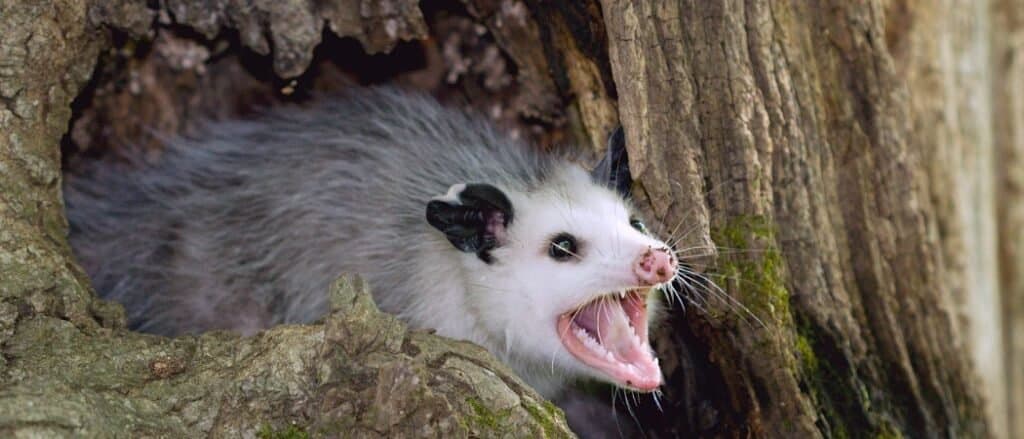
Possums who feel threatened will try to escape. Failing that, they will either bare their teeth or
play dead
.
©iStock.com/rexlis
Possums and opossums are generally not dangerous to humans. They are furtive, shy creatures that avoid notice whenever possible. If spotted, possums will do everything they can to escape. If this is not feasible, they will bare their teeth and snarl in hopes of scaring off their attacker. Bites and scratches are rare, but it’s best to keep a safe distance and allow them a means of escape.
Opossums have a particularly fascinating method of self-defense. They famously “play possum,” which is another term for playing dead. Scientists also call this “apparent death.” Playing possum is an involuntary response to stress, occurring outside the opossum’s control. The animal goes into a catatonic state, sporting a limp body, protruding tongue, and suppressed breathing. It also releases a powerful stench to deter predators. While in this state of tonic immobility, the opossum is unable to respond to stimuli of any kind. It takes anywhere from a few minutes to a few hours for the animal to recover.
While possums may not be blind, vision is not their keenest sense. If you suspect a possum or opossum is nearby, make noise so it has a chance to get away.
Up Next:
- Possum vs. Opossum: How to Say It and How to Tell the Difference
- Why Do Opossums Play Dead?
- Playing Possum: 9 Animals That Play Dead to Survive
- Possums As Pets: Can You Do This, And Should You?
The photo featured at the top of this post is © iStock.com/randimal
Thank you for reading! Have some feedback for us? Contact the AZ Animals editorial team.



